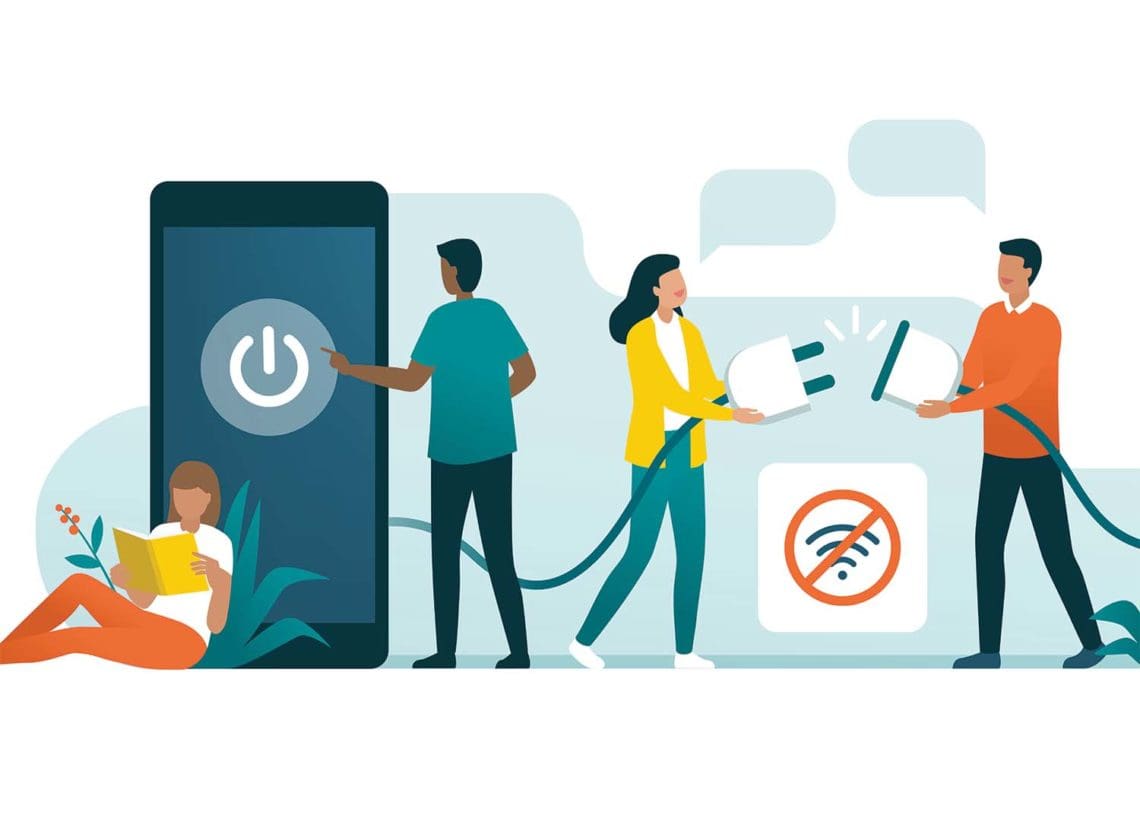nomophobia – no–mobile-phone-phobia. The fear of not having your phone with you. Word of the year in 2018, according to a Cambridge dictionary poll.
Over the summer, I took a four-day “hard reset” where I completely disconnected from the world. No internet, no phone, no computer, no fitness tracker — really no connection to electronics. Shockingly, the world did not end. Everyone managed to find a way to adjust and I survived the experience. Even better than surviving, I learned that there is a peace and benefit from disconnecting to reconnect.
The hard facts are pretty scary when it comes to cell phone addiction and usage:
- Two in three college students in a study said they were addicted to their phones.
- More humans have access to cell phones than to toilets.
- According to Psychology Today, 20 percent of people would rather go without shoes for a week than not use their phones.
While we can’t always disconnect entirely, we can make better choices about when to connect and how to connect. To help create some healthier habits, here are a few key tips to have everyday limits on your mobile phone usage.
Create boundaries for your daily digital life: Set specific times of day when tech is off limits. You can set your device to go into airplane mode or set a “bedtime” when you won’t get notifications. There are two places you can start focusing restrictions:
- At home: Your phone is not a utensil and is certainly not required to eat. It also isn’t a way to socialize in the same room with people. So, put the device away and enjoy both the conversations and the meal itself. (And in case you need extra incentive, studies show that about 75 percent of people take their phones into the bathroom with them. You wouldn’t bring your toilet to the table for dinner, so ditch the phone for meals.)
- At work: One of the major distractions during the day is picking up the cell phone. Whether it is to avoid the feeling of boredom or to review notifications, mobile devices can be a major distraction from the work at hand. Super users of cell phones have been known to touch their device thousands of times a day! So, set aside the phone and identify specific times to check in rather than having the device dictate your schedule.
Turn off your notifications: Turn off push notifications. If you can’t turn off all of them, turn off the majority. This not only limits distractions, but it also allows you to focus and conserves battery life. Since responding to notifications can be a bit Pavlovian, limiting the stimulus will reduce your stress and anxiety.
Shut down for your evening and morning routines: Spend the first hour and last hour of your waking time device-free. Start the day without the distraction of your mobile device. Enjoy the pace of getting started without the overwhelm of to dos. The last hour of the day should also be a technology-free zone, as you prepare yourself physically and mentally to rest. It is well-known that blue light interrupts normal circadian sleep rhythms, so removing devices before bedtime will also help you more easily and naturally fall asleep. (And get an old fashioned alarm clock to avoid having your phone in the bedroom.)
By adopting one or more of these tips, you can find your way to a healthier and happier relationship with your mobile device.
This content was originally published at thriveglobal.com.



 Lisa Beth Lentini Walker, who began contributing to CCI in 2022 as Well-Being Editor, is the CEO of Lumen Worldwide Endeavors, a firm specializing in compliance, governance and ethics consulting. She is a National Board Certified Health & Wellness Coach (NBC-HWC) and a certified meditation and mindfulness specialist. She also is an adjunct professor of law in the U.S. and EU. Lisa Beth has led award-winning legal and compliance departments within large public corporations and privately held enterprises. She does this by strategically aligning resources to create efficiencies and advising the board of directors to further strategic initiatives while mitigating risks in all aspects of the domestic and global operations. She has held corporate secretarial, legal, compliance, ethics, governance and risk positions as an attorney at a Fortune 50 corporation, as the compliance leader of a global travel company operating in 150 countries and as the corporate secretary, chief compliance officer and co-chair of the risk council at a NYSE-listed corporation. Lisa Beth also served with U.S. Securities and Exchange Commission in Washington, D.C., in the Divisions of Corporation Finance and Enforcement. Lisa Beth is a member of the Minnesota, New Jersey, New York and District of Columbia bars. She delights in the art of possibility. In her free time, she is an advisory board member to a women’s fashion startup, Alice Riot, she serves on the board of Stages Theatre (a children’s theatre) in Hopkins, Minnesota, and is a member of the Board of Directors of the Society of Corporate Compliance and Ethics and the Healthcare Compliance Association (SCCE/HCCA). Lisa Beth co-authored the book,
Lisa Beth Lentini Walker, who began contributing to CCI in 2022 as Well-Being Editor, is the CEO of Lumen Worldwide Endeavors, a firm specializing in compliance, governance and ethics consulting. She is a National Board Certified Health & Wellness Coach (NBC-HWC) and a certified meditation and mindfulness specialist. She also is an adjunct professor of law in the U.S. and EU. Lisa Beth has led award-winning legal and compliance departments within large public corporations and privately held enterprises. She does this by strategically aligning resources to create efficiencies and advising the board of directors to further strategic initiatives while mitigating risks in all aspects of the domestic and global operations. She has held corporate secretarial, legal, compliance, ethics, governance and risk positions as an attorney at a Fortune 50 corporation, as the compliance leader of a global travel company operating in 150 countries and as the corporate secretary, chief compliance officer and co-chair of the risk council at a NYSE-listed corporation. Lisa Beth also served with U.S. Securities and Exchange Commission in Washington, D.C., in the Divisions of Corporation Finance and Enforcement. Lisa Beth is a member of the Minnesota, New Jersey, New York and District of Columbia bars. She delights in the art of possibility. In her free time, she is an advisory board member to a women’s fashion startup, Alice Riot, she serves on the board of Stages Theatre (a children’s theatre) in Hopkins, Minnesota, and is a member of the Board of Directors of the Society of Corporate Compliance and Ethics and the Healthcare Compliance Association (SCCE/HCCA). Lisa Beth co-authored the book, 





